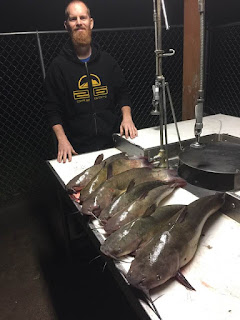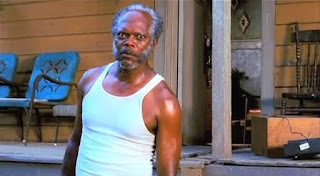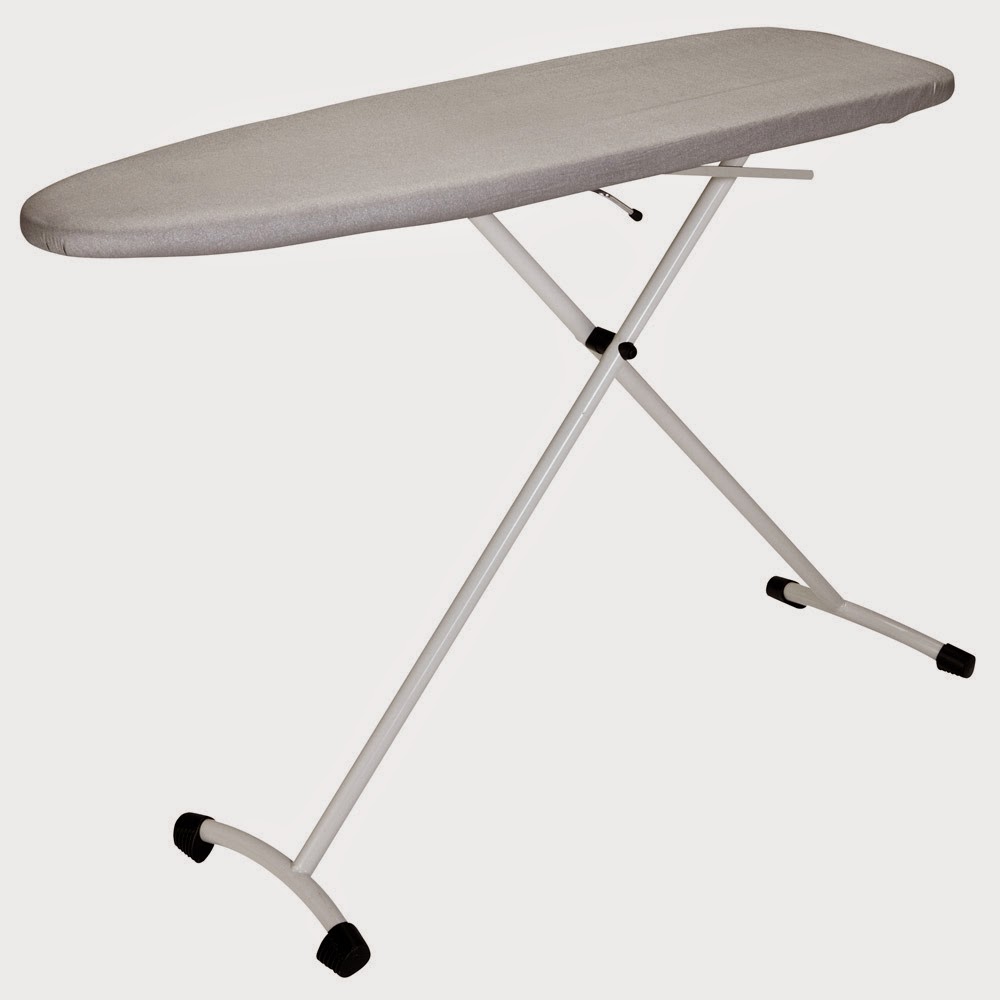I went fishing with my friend Curt a while back. We caught some big ones! Curt is a hard working farmer, loves God, has a great sense of humor, and is one of those guys who would give you the shirt off his back if you needed it. Truly a great man. He showed me a good spot to fish since I'm still fairly new to this area, and haven't done much fishing lately. It felt great to reengage something I used to do a lot more of.
This picture is right before we filleted them. I won't show you any pictures after we filleted them...😛
As we were cleaning the fish, I started to wonder what it would feel like to be filleted alive. I mean, these fish were mostly dead by this point, but still... ouch.
All so I could enjoy some tasty fillets. I found a recipe online for a catfish sauce, smothered some fillets, and then grilled them. And they were quite tasty. I was nourished both in body and soul, because eating the fish I just caught does something good for my soul. I'm not sure if it's a macho man thing (*grunt* "I just caught my own dinner! I could survive in the wild! I'm basically Macgyver on steroids!" *grunt*) or if it's simply reconnecting me to the land, and I'm realizing how modern life often isolates me from it.
Anyway, the point is that these fish are a metaphor. They died to contribute to my living. And that sounds a lot like Jesus.
Many things die so that other things can live. It seems to happen a lot in this universe, this cycle of death to life. Fish die so people and animals can be nourished. Lots of different animals die so other animals and people can be fed. Plants die so other living things can eat them and live. Skin cells die and flake off so new cells can be born. Stars die and new stars are formed. In the fall and winter, much of the vegetation dies and then in the spring and summer--new life appears! This mysterious cycle of death to life can be seen everywhere, displayed in pictures and metaphors. It's like the whole creation is telling a particular story.
And it seems to be at the heart of the spiritual life. Jesus died to give us life. We have to go through a kind of death to find true life. "Whoever does not carry their cross and follow me cannot be my disciple" (Luke 14:27). We have to abandon the false self to find the true self. And it's not just once, but a pattern that repeats itself over and over. The gospels tell the story of Jesus this way, in a pattern of his life leading to his death on a cross, and culminating in his resurrection. Death to Life.
And then the New Testament proclaims, "Christ is your life" (Colossians 3:4). Through the death and resurrection of Christ, our lives are joined with him so that we also die and are raised to new life, the life of Christ in us. And so we should expect the pattern of the Christ--life, death, resurrection--to also be true in us. We die to the old self, the way of sin and self-centered living, and become vessels of Christ's self-emptying love, broken and poured out for the sake of others so that they may also live.
That's the symbol and meaning of baptism: "Or don’t you know that all of us who were baptized into Christ Jesus were baptized into his death? We were therefore buried with him through baptism into death in order that, just as Christ was raised from the dead through the glory of the Father, we too may live a new life" (Romans 6:3-4).
It's also the meaning of Communion. In the mystery of the Lord's Supper, we ingest the bread and wine (or grape juice if you're a good Protestant), the body and blood of Christ, which nourishes us. Christ's death has become our life. "Do this in remembrance of me" (1 Corinthians 11:23-26).
I think most people have at least an intuitive sense that there is something true about this way of being in the world. The way to life is self-emptying, sacrificing, giving, even dying for the sake of another... or very simply, Love. When we live in Love, we are flowing with the river (1 John 4:16)-- the universal pattern of death to life. When we live self-centered lives, refusing Love, we are trying to swim upstream against the river. Over time it becomes pretty obvious which one leads to true life and which one leaves us exhausted, though all of us have a natural desire to swim upstream.
Take any relationship: marriage, family, friendships--they don't work unless we are flowing with the river. We have to be self-emptying, sacrificial, giving people if relationships are going to last. We have to die to that part of ourselves that wants to be self-centered, swimming upstream all by ourselves. To die to that part of ourselves is to let go and trust the river to carry us and take us home. It may seem like it costs a lot to give up our self-centered way of life, but the cost of swimming upstream in self-centered delusion is far greater. Letting go is a kind of death, but it leads to life.
All of life is filled with this sacrament of death to life. I wonder if that's why the scripture writers talked so much about giving thanks, since we're all in this constant give and take and we're all interconnected and everything is a gift from God. Only arrogance allows us to believe we are self-made individuals and that we don't need anyone or anything else.
I'll probably never look at fishing the same way again, and maybe you won't either, but that's just the way my weird brain works.
Monday, July 9, 2018
Friday, July 6, 2018
Getting Triggered
Oh, this picture makes me laugh! It is a perfect image for this post...
Recently I was scrolling through Facebook, and I came across a post that triggered me. For those unfamiliar with the term "triggered," it's when something gets under your skin in a particularly surprising and irritating way, and even reawakens trauma from your past. Just think of the classic reaction of sudden rage above, displayed by Samuel L. Jackson in some of his movie characters, and you get the idea.
When I get triggered, I feel a sudden rush of emotion, perhaps fear or anger, my heart beats faster, and I can't catch my breath as easily. I feel anxiety in my chest. It can be something minor, like a hurtful or irritating encounter with a person. Or it could be something major, like reliving the nightmare of a traumatic experience.
I'm guessing you can think of situations where this happens for you. Perhaps a certain person knows just how to push your buttons the right way, and you get flustered just by being around them. Or maybe when you encounter a certain image or circumstance, it reminds you of something traumatic. I remember some friends who stopped coming to a church I used to be part of because their family member, who was deeply connected to the church, had recently died and so coming to church triggered them. It was just too hard emotionally.
A lot of times, authority figures or family members can be triggering because of past experiences of abuse by someone that was supposed to protect you. Whatever it is that triggers you, you may not even be aware that it happens until someone describes it, like I just attempted to. It can be largely subconscious. But once you do recognize when it happens, you may notice that it is sort of debilitating when it happens. Your body begins to react and there is nothing you can do in the moment to stop it, which can make you feel pretty powerless. This is why people who are aware of their trigger points will avoid certain people or situations that they know will trigger them.
My wife and I have experienced 4 miscarriages during our 15+ years of marriage. Each time it was pretty traumatic, particularly the 4th one, which happened much later in the pregnancy than the others. When I worked as a chaplain in a hospital, one of the hardest things I had to do was care for people who were going through the loss of a baby. It triggered me like crazy. It brought up all the emotions of loss and devastation that my wife and I had experienced together.
The most natural thing to do is to run from our pain. Seriously, who wants to hurt? But I've learned that at some point, the healthy thing to do is to face it. One book that was incredibly helpful to me was The Body Keeps the Score by Bessel van der Kolk, M.D. He does an incredible job explaining how the body stores trauma, and then he provides some ways forward. That book, combined with some dear friends and mentors who helped me walk through my pain, helped me see that our trigger points can actually be our greatest teachers. Rather than running from the pain they bring up, we can see these trigger points as an invitation into healing and transformation.
I've learned a lot from other people describing their trigger points and how they began to find healing when they faced the trauma that was being awakened. But even with a lot of great insight into these things, to actually go on the journey of healing can be really challenging. It is like walking into a death of sorts. Sometimes we just aren't ready and the timing isn't right. But at some point, it becomes more painful and destructive to stay as we are than to walk directly into the pain we are avoiding, so that we can begin to heal.
A similar way people talk about this today is "emotional health" or "emotional sobriety." Have you ever had those moments where certain people or certain situations make you suddenly feel like a little child emotionally? It's like suddenly I regress into a younger version of myself, and I'm not able to see myself as an adult having a conversation with another adult. Then later, I'll replay the interaction and wonder what in the world happened and why I felt so immature or childish or inferior in that moment. There's all kinds of stuff going on inside us.
In the West, we've tended to ignore emotions and feelings until fairly recently, dismissing them as unreliable and secondary to cognitive knowledge. For a long time people believed if we could just get the facts and information right, we could fix things. But dismissing and ignoring our emotional capacities has proven to have negative consequences, and neuroscience seems to show that they are all intertwined parts of what makes us who we are. I'm not saying we should be led by our feelings (they are not good masters!), but we never heal if we don't address this part of ourselves. A good counselor or spiritual director can be incredibly helpful with this.
People often get nervous when we talk about dealing with our "feelings," and believe me, I get it. Who wants to dive into that mess of unpredictability and pain? And who wants to admit they are seeing a "counselor?" Seriously, so much shame exists in our culture for those who don't independently have it all together. But that's all a mythical facade. I highly recommend a good counselor or spiritual director or even just a good friend to help you walk through your emotional pain and baggage. It can be very liberating just to acknowledge it and recognize it for what it is.
I've spent a lot of time avoiding my pain rather than facing it. But it just kept surfacing, and I would get angry... angry that I couldn't just make it go away, angry that I felt powerless to control it, angry that it was even an issue, because I didn't even really know why I was getting angry! So I've been diving in for the last few years, and it has changed the trajectory of my life. Healing is slow, but steady. These days when I get triggered, I don't just run away or let my anger boil. Instead I ask, "What's this about? Why is this affecting me this way? What is the feeling I'm experiencing, and where in my body do I feel it?" Then through prayer and meditation, I present it to God and walk through it with Him. Remember, the Holy Spirit is called "the Counselor." We all need counseling, apparently. I want wholeness and healing, so I'm willing to face my demons. Dragons can be slain.
Some people are "less emotional" than others, and will want to dismiss all of this. That's fine. But for those who can identify with any of what I wrote above, just know that I also dismissed all of it... for a very long time. I believed that feelings and emotions were completely unimportant and unreliable and should not be considered "spiritual." How wrong I was to segregate and compartmentalize myself like that. And how incredibly healing it has been to finally acknowledge this part of my being. God is so patient, and so good. Take these things to him and let him go to work. Face the dragon. It will be hard, but it will change your life.
Tuesday, July 3, 2018
An Open Letter to the Creator of the Ironing Board
To the creator of the
modern, household ironing board:
You think you're slick, but I’m on to you. You tried to make us all
think you were doing us a favor. You wanted us to believe that this nifty,
lightweight, foldable-for-easy-storage contraption was meant to bless every
home that needs to de-wrinkle clothing. But I’m on to you. Your secret is out.
I know the truth. You hate all of humanity.
I, too, once believed that this slick,
pointed surface that stands on a pair of crisscrossed metal legs would benefit my life. And in one sense, it truly does. Thankfully we do not
have to take our clothes to the dry cleaner and pay them every time we need to
get wrinkles out. We can simply pull out the ol’ handy dandy ironing board.
But that’s as far as the blessing goes.
Because once you extend those crisscrossed legs in order to raise that board up
to waist level, it’s all over. Whatever thoughts one had of nicely ironed
clothing, perhaps with the fresh scent of pine still lingering, are suddenly
ruined in an instant. Whatever dreams one had of a warm and peaceful day are completely
obliterated with a shriekish, earsplitting, ungodly squeal from another world.
It’s hard to put into words how awful
that sound is. And it must’ve taken hours and hours of careful preparation for
you to craft the way those metal parts would slide against each other at just
the right angle so as to torture every human soul who dared unfold the ironing
board without first putting in ear plugs.
I thought maybe my ironing board was defective.
Just maybe that earsplitting, skull-cracking, hellish noise that ruins every
day, is simply the result of
wear and tear. Maybe that horrendous experience that takes away all promise and hope is just due to a manufacturing error. But I’ve learned something over the years. They all make the noise. Every. Single. One. It doesn’t matter if it’s new
or old, worn out or not. It doesn’t matter if you unfold it fast or slow, held
upright or flat. It doesn’t matter if you’re in Kansas or in Florida. That
awful squeal is the same everywhere because they were designed
to make that gut-wrenching, trauma inducing experience every single time you
unfold those seemingly innocent crisscrossed metal legs.
Have you ever tried to iron your clothes early in the morning, without waking up the kids? Well, if you didn't plan ahead and unfold the scissor legs of death the night before, you might as well forget it. Everyone will wake up. Who could possibly sleep through that shriek of terror? You'd have a better chance skateboarding over the Atlantic during a hurricane.
Have you ever tried to iron your clothes early in the morning, without waking up the kids? Well, if you didn't plan ahead and unfold the scissor legs of death the night before, you might as well forget it. Everyone will wake up. Who could possibly sleep through that shriek of terror? You'd have a better chance skateboarding over the Atlantic during a hurricane.
And so, fiendish creator of the ironing board, your hatred of all humanity is
exposed. One wonders what sorts of experiences cause a person to want to inflict
so much pain and suffering on others. I suppose we will never know. But now I’m going to
rebel against your evil scheme. If my dryer doesn’t get out the wrinkles, I’ll
just wear wrinkled clothing. I don’t care. Better to enjoy life than to suffer so
much for pressed shirts. I hope someday you can find peace. I know I will, now
that I’ve uncovered your evil plan.
Subscribe to:
Posts (Atom)



